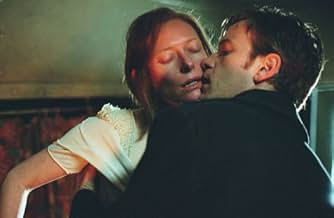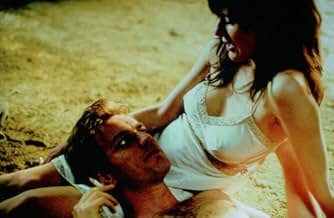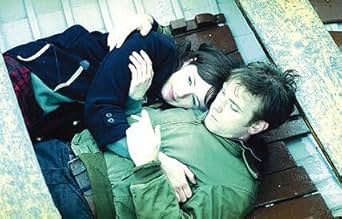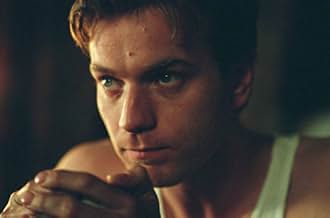CALIFICACIÓN DE IMDb
6.3/10
15 k
TU CALIFICACIÓN
Un joven vagabundo que trabaja en una barcaza fluvial interrumpe la vida de sus empleadores mientras oculta el hecho de que sabe más sobre una mujer muerta encontrada en el río de lo que adm... Leer todoUn joven vagabundo que trabaja en una barcaza fluvial interrumpe la vida de sus empleadores mientras oculta el hecho de que sabe más sobre una mujer muerta encontrada en el río de lo que admite.Un joven vagabundo que trabaja en una barcaza fluvial interrumpe la vida de sus empleadores mientras oculta el hecho de que sabe más sobre una mujer muerta encontrada en el río de lo que admite.
- Premios
- 7 premios ganados y 17 nominaciones en total
- Dirección
- Guionistas
- Todo el elenco y el equipo
- Producción, taquilla y más en IMDbPro
Argumento
¿Sabías que…?
- TriviaEwan McGregor's nude scenes were originally going to be cut from the U.S. release, but after McGregor objected, the full-frontal nude scenes were put back in.
- ErroresIn a wide shot of the skyline of Glasgow from Kelvingrove Park, the Glasgow Tower can be seen on the horizon. The tower wasn't built until 2000.
- Citas
Les Gault: What'd you do that for?
Joe Taylor: I had no use for it.
Les Gault: Must be worth something, though.
Joe Taylor: Not to me.
- Versiones alternativasThe UK version contains a sex scene featuring Ewan McGregor. The MPAA has cut it from the US release for 2004.
- ConexionesFeatured in Indie Sex: Censored (2007)
Opinión destacada
By halfway through this story, the biblical underpinnings become firmly apparent: this is an allegory for The First Man, and his base, animal instincts. Hence, it's a tried and true thematic device, used by many authors: for example, in the tradition of Saturday Night and Sunday Morning (1960), Sons and Lovers (1960), and many other films that explore sexual transgressions coupled with (no pun intended) unrelenting naked desire, the author, Alexander Trocchi, presents his version of the modern Adam – always on the make, and totally suffused with his own animal desires and his pretentious efforts at self-fulfillment.
In truth, the Young Adam of this story, Joe Taylor (Ewan McGregor) is portrayed as, at best, misanthropic and crypto-misogynistic. Taken to extreme, Young Adam could be borderline sociopath in another story and setting. This is not satire, however, as with Patrick Bateman (deliciously played by Christian Bale) in American Psycho (2000). No, this is a reality that existed in the 1950s setting of the novel and which remains a stigma within all humans today. In truth, I think it was St.Jerome, in one of the biblical stories, who moaned about his need for release from his sexual depravities. But, nothing much changes in human relationships, from antiquity to now.
In a manner, you can look at this story as Ingmar Bergman for the poorer masses – another version of dirty scenes from a dirty marriage: because in this plot, the unwashed Joe is presented with a moral dilemma as the story progresses: am I truly my brother's keeper? So, the question for him, finally, is: will he be able to rise above his animality and achieve a humanity that he has avoided throughout his young life to date?
McGregor's acting in this story is stunning; so also Tilda Swinton as Young Adam's latest sexual conquest (Ella) aboard a coal-carrying canal barge (aptly named Atlantic Eve) where he thinks he's escaping from his responsibilities. Poor Joe – he's such a slave to his desires, he just can't stop: on the barge, in alleyways, under trucks, on the floor, against a canal wall – anywhere for a quick hit, so that he can forget about his failure as an aspiring writer, among other things. To that extent, one is reminded of the controlled excesses in Last Tango in Paris (1972), where Marlon Brando gave his finest performance as another poor slave to animal passions. And, while on the topic, how can anybody forget sociopathic Frank Booth (Dennis Hopper) and his velvet fetish in Blue Velvet (1986)?
On the other hand, the same theme has been used for light or outrageous comedy with films such as Tom Jones (1963), Kubrick's masterpiece Barry Lyndon (1975) and Boogie Nights (1997), all worth seeing, simply because none hurt the psyche.
But, getting back to Joe – so ordinary Joe, a symbol for all men, young and older – as he fills his days as a canal-worker-slave, obtaining relief from boredom only when satisfying his slavish work in a different type of living canal. Significantly, the director has the barge enter a few dark, moist tunnels through which the barge travels – and with the men treading all over it, albeit somewhat delicately, and just enough to make sure they exit carefully.
You don't get symbols like that too often in films; a delight to savor, for the location and the execution.
The denouement for the story arrives when our Joe makes his moral choice – a choice so fundamental, you stare at his face, watching his look, the tortured eyes, the mouth, his eyebrows, all as an expression of the raging dilemma within his animal/human brain. Rarely will you see such a choice done so well, and with such resigned finality – and a mirror for all of us to ponder in our darkest hours.
The supporting cast is exemplary, while the photography, sound and editing match the needs for such an important – and yet ordinary – story to be portrayed so professionally. Occasionally, it was momentarily difficult to sort out past, present and future; but not so much that the structure caused any unresolved confusion.
The NC-17 and R ratings are appropriate: this is not a film for children or adolescents. But, I highly recommend it for all adults – young and old – who are not afraid to look critically within themselves.
May 10, 2011.
In truth, the Young Adam of this story, Joe Taylor (Ewan McGregor) is portrayed as, at best, misanthropic and crypto-misogynistic. Taken to extreme, Young Adam could be borderline sociopath in another story and setting. This is not satire, however, as with Patrick Bateman (deliciously played by Christian Bale) in American Psycho (2000). No, this is a reality that existed in the 1950s setting of the novel and which remains a stigma within all humans today. In truth, I think it was St.Jerome, in one of the biblical stories, who moaned about his need for release from his sexual depravities. But, nothing much changes in human relationships, from antiquity to now.
In a manner, you can look at this story as Ingmar Bergman for the poorer masses – another version of dirty scenes from a dirty marriage: because in this plot, the unwashed Joe is presented with a moral dilemma as the story progresses: am I truly my brother's keeper? So, the question for him, finally, is: will he be able to rise above his animality and achieve a humanity that he has avoided throughout his young life to date?
McGregor's acting in this story is stunning; so also Tilda Swinton as Young Adam's latest sexual conquest (Ella) aboard a coal-carrying canal barge (aptly named Atlantic Eve) where he thinks he's escaping from his responsibilities. Poor Joe – he's such a slave to his desires, he just can't stop: on the barge, in alleyways, under trucks, on the floor, against a canal wall – anywhere for a quick hit, so that he can forget about his failure as an aspiring writer, among other things. To that extent, one is reminded of the controlled excesses in Last Tango in Paris (1972), where Marlon Brando gave his finest performance as another poor slave to animal passions. And, while on the topic, how can anybody forget sociopathic Frank Booth (Dennis Hopper) and his velvet fetish in Blue Velvet (1986)?
On the other hand, the same theme has been used for light or outrageous comedy with films such as Tom Jones (1963), Kubrick's masterpiece Barry Lyndon (1975) and Boogie Nights (1997), all worth seeing, simply because none hurt the psyche.
But, getting back to Joe – so ordinary Joe, a symbol for all men, young and older – as he fills his days as a canal-worker-slave, obtaining relief from boredom only when satisfying his slavish work in a different type of living canal. Significantly, the director has the barge enter a few dark, moist tunnels through which the barge travels – and with the men treading all over it, albeit somewhat delicately, and just enough to make sure they exit carefully.
You don't get symbols like that too often in films; a delight to savor, for the location and the execution.
The denouement for the story arrives when our Joe makes his moral choice – a choice so fundamental, you stare at his face, watching his look, the tortured eyes, the mouth, his eyebrows, all as an expression of the raging dilemma within his animal/human brain. Rarely will you see such a choice done so well, and with such resigned finality – and a mirror for all of us to ponder in our darkest hours.
The supporting cast is exemplary, while the photography, sound and editing match the needs for such an important – and yet ordinary – story to be portrayed so professionally. Occasionally, it was momentarily difficult to sort out past, present and future; but not so much that the structure caused any unresolved confusion.
The NC-17 and R ratings are appropriate: this is not a film for children or adolescents. But, I highly recommend it for all adults – young and old – who are not afraid to look critically within themselves.
May 10, 2011.
- RJBurke1942
- 8 may 2011
- Enlace permanente
Selecciones populares
Inicia sesión para calificar y agrega a la lista de videos para obtener recomendaciones personalizadas
- How long is Young Adam?Con tecnología de Alexa
Detalles
- Fecha de lanzamiento
- Países de origen
- Sitio oficial
- Idioma
- También se conoce como
- Thời Trai Trẻ
- Locaciones de filmación
- Productoras
- Ver más créditos de la compañía en IMDbPro
Taquilla
- Presupuesto
- USD 6,400,000 (estimado)
- Total en EE. UU. y Canadá
- USD 767,373
- Fin de semana de estreno en EE. UU. y Canadá
- USD 50,278
- 18 abr 2004
- Total a nivel mundial
- USD 2,561,820
- Tiempo de ejecución1 hora 38 minutos
- Color
- Mezcla de sonido
- Relación de aspecto
- 2.35 : 1
Contribuir a esta página
Sugiere una edición o agrega el contenido que falta








































